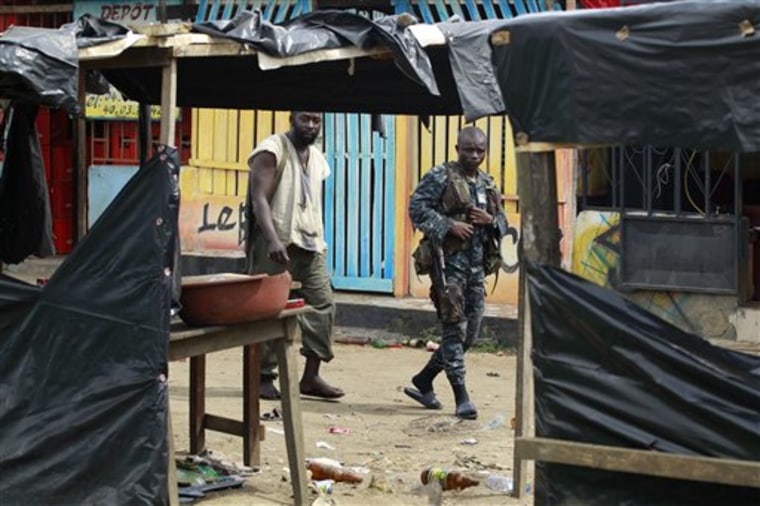The U.N. says more than 100 bodies have been found in Ivory Coast in the past 24 hours, some of them burned alive.
About 60 were killed in one incident and about 40 people in another that appears to have been carried out by Liberian mercenaries, says Rupert Colville, spokesman for the U.N. High Commissioner for Human Rights, said "all the incidents appear at least partly ethnically motivated."
He said there were still other reports of "smaller-scale killings in other places that have yet to be investigated."
Colville said some of the victims were burned alive while others were thrown down a well.
Meanwhile, Ivory Coast presidential claimant Alassane Ouattara called for an end to sanctions and sought to return the war-torn country to normal, despite a continuing military standoff with incumbent Laurent Gbagbo.
U.N.-backed Ouattara said Thursday his forces had blockaded Gbagbo in the presidential residence in Abidjan and he had asked the European Union to lift sanctions on the main ports of the world's top cocoa producer.
With Gbagbo refusing to step down, Ouattara, who the U.N. says won a presidential election meant to draw a line under Ivory Coast's 2002-3 civil war, took the first steps toward assuming executive powers in a televised address on Thursday.
He promised to restore security and utilities, meet basic needs and pay salaries after five months of conflict which has killed thousands of people and left residents of what was once West Africa's most prosperous country without food and water.
In New York, Ouattara's U.N. envoy accused Gbagbo of arming his supporters all over the country but said Ouattara would soon announce an end to a ban on cocoa exports he imposed in January. Dealers say about 500,000 metric tons of cocoa is stuck in the country.
"I have asked that European Union sanctions on the ports of Abidjan and San Pedro and certain public entities, be lifted," Ouattara said in a speech broadcast on French television.
The European Union said Friday it is working on Ouattara's request.
"I have also asked the central bank BCEAO to reopen its branches in Ivory Coast, to ensure a resumption of operations in all banks so as to enable the payment of salaries and arrears in the shortest possible time," he said on television channel LCI.
Diplomatic and military efforts to oust Gbagbo this week have been met with fierce resistance and Ouattara said his residence had been sealed off to protect the area.
"As for the outgoing President Mr. Laurent Gbagbo, who has entrenched himself at the presidential residence in Cocody with heavy weapons and mercenaries, a blockade has been established around the perimeter to secure the inhabitants of the district," Ouattara said.
A week of fighting for control of the economic capital Abidjan has driven terrified residents to scramble to find food and water, with frequent power cuts and hospitals overwhelmed with wounded.
"Every morning people have to take jerrycans to walk around the neighborhood and search for water," Cocody resident Jean-Claude said. "As for food, there is nothing left. People have to queue up in long lines to buy even a single baguette."
Ouattara said he had asked generals to take all necessary steps to maintain order and security of goods, people and their movements and also secure the delivery of food to markets and medicines in hospitals and health centers.
He said steps would also be taken to shed light on all crimes committed during the conflict and would collaborate with international organizations to investigate human rights abuses and punish those found guilty.
